

Rootstrikers TED Talk remix. CASH TRANSFER FILM. India’s Experiment in Basic Income Grants. By Guy Standing, School of Oriental and African Studies, UK Globalization has brought not just greater inequalities but also chronic economic uncertainty to the world’s population.
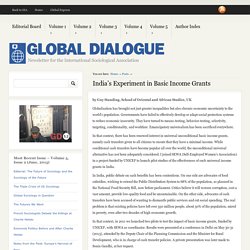
Governments have failed to effectively develop or adapt social protection systems to reduce economic insecurity. They have turned to means-testing, behavior-testing, selectivity, targeting, conditionality, and workfare. Emancipatory universalism has been sacrificed everywhere. In that context, there has been renewed interest in universal unconditional basic income grants, namely cash transfers given to all citizens to ensure that they have a minimal income. In India, public debate on cash benefits has been contentious. In that context, in 2011 we launched two pilots to test the impact of basic income grants, funded by UNICEF, with SEWA as coordinator. The money was paid individually, initially as cash and after three months into bank or cooperative accounts. 1. Why economists are almost always wrong. That verbose title is almost the reverse of a quintessentially arrogant statement of economic supremacy published in the UK’s Daily Telegraph - on the editorial page of the business section - by Andrew Lilico.
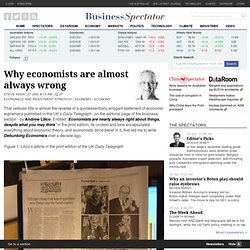
Democracy at Work: How This One Big Idea Could Make Your Job Amazing and Revolutionize the Economy. Democracy at Work is a project that aims to build a social movement.
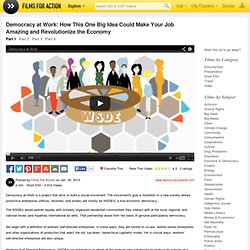
The movement's goal is transition to a new society whose productive enterprises (offices, factories, and stores) will mostly be WSDE's, a true economic democracy. The WSDEs would partner equally with similarly organized residential communities they interact with at the local, regional, and national levels (and hopefully international as well). That partnership would form the basis of genuine participatory democracy. We begin with a definition of workers' self-directed enterprises.
It Doesn't Have to Be This Way. "Induce people all to want the same thing, hate the same things, feel the same threat, then their behavior is already captive--you have acquired your consumers or your cannon-fodder.
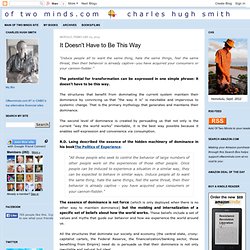
"The potential for transformation can be expressed in one simple phrase: it doesn't have to be this way.The structures that benefit from dominating the current system maintain their dominance by convincing us that "the way it is" is inevitable and impervious to systemic change. Capitalism vs. Democracy. Thomas Piketty’s new book, “Capital in the Twenty-First Century,” described by one French newspaper as a “a political and theoretical bulldozer,” defies left and right orthodoxy by arguing that worsening inequality is an inevitable outcome of free market capitalism.
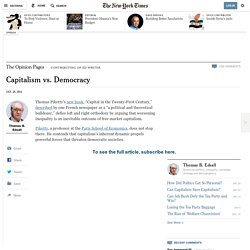
Piketty, a professor at the Paris School of Economics, does not stop there. He contends that capitalism’s inherent dynamic propels powerful forces that threaten democratic societies. Capitalism, according to Piketty, confronts both modern and modernizing countries with a dilemma: entrepreneurs become increasingly dominant over those who own only their own labor. In Piketty’s view, while emerging economies can defeat this logic in the near term, in the long run, “when pay setters set their own pay, there’s no limit,” unless “confiscatory tax rates” are imposed. Photo “I am hesitant to call Thomas Piketty’s new book Capital in the 21st Century one of the best books in economics written in the past several decades.
Does the internet promote fairness of income distribution? (w/ Video) (Phys.org) —The question of how an economic system should be structured in order to best promote fairness and equality is one of the most debated subjects of all time.
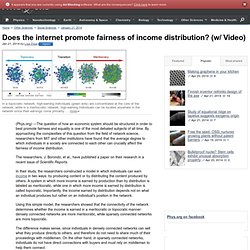
By approaching the complexities of this question from the field of network science, researchers from MIT and other institutions have found that the average degree to which individuals in a society are connected to each other can crucially affect the fairness of income distribution. The researchers, J. Borondo, et al., have published a paper on their research in a recent issue of Scientific Reports. In their study, the researchers constructed a model in which individuals can earn income in two ways: by producing content or by distributing the content produced by others. For the Love of Money. Development: Time to leave GDP behind. Robert F.
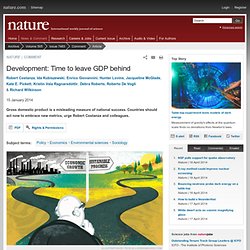
Kennedy once said that a country's gross domestic product (GDP) measures “everything except that which makes life worthwhile”. The metric was developed in the 1930s and 1940s amid the upheaval of the Great Depression and global war. Even before the United Nations began requiring countries to collect data to report national GDP, Simon Kuznets, the metric's chief architect, had warned against equating its growth with well-being. GDP measures mainly market transactions. More Media. Why we should give free money to everyone. London, May 2009.Read the Dutch version here / Lees de Nederlandse versie van dit artikel hier.
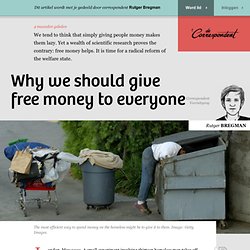
A small experiment involving thirteen homeless men takes off. They are street veterans. Some of them have been sleeping on the cold tiles of The Square Mile, the financial center of the world, for more than forty years. Their presence is far from cheap. Police, legal services, healthcare: the thirteen cost taxpayers hundreds of thousands of pounds. That spring, a local charity takes a radical decision. Restructuring the economy with empathy as its center. Democracy is lost unless we re-structure our economies, and re-structuring our economies requires a new operating system based on different values.
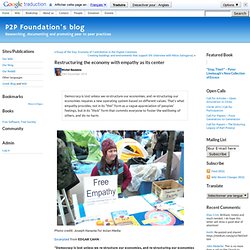
That’s what empathy provides, not in its “thin” form as a vague appreciation of peoples’ feelings, but in its “thick” form that commits everyone to foster the wellbeing of others, and do no harm. Photo credit: Joseph Hanania for Aslan Media. Let's make everything FREE! An introduction to The Free World Charter. Social Pathology - Citi Group Memo. 37 Facts About How Cruel This Economy Has Been To Millions Of Desperate American Families.
First published in October 2012.
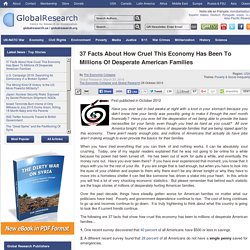
Peter Turchin – The history of inequality. Today, the top one per cent of incomes in the United States accounts for one fifth of US earnings. The top one per cent of fortunes holds two-fifths of the total wealth. Just one rich family, the six heirs of the brothers Sam and James Walton, founders of Walmart, are worth more than the bottom 40 per cent of the American population combined ($115 billion in 2012). Konkurrencestaten – et taberprojekt - Kronikker. Eight Elementary Errors of Economics (slightly revised) The long, and slightly modified, version of Eight Elementary Errors of Economics is now on SteveKeen’s Debtwatch. Reblogged on Business Spectator, 22 June and The Bull 23 June. I consolidated two of the previous points and added what is now the final point on emergent wealth of land. See also on Real World Economics Review Blog, 7 June, with long discussion. Post edited 4 July: the full modified version now follows, so it’s all consolidated here.
Debunking Economics - Revised and Expanded Edition: The Naked Emperor Dethroned?: Steve Keen: 9781848139923: Amazon.com. The Rich Don't Always Win: The Forgotten Triumph over Plutocracy that Created the American Middle Class, 1900-1970: Sam Pizzigati: 9781609804343: Amazon.com. Debunking Economics - Revised and Expanded Edition: The Naked Emperor Dethroned?: Steve Keen: 9781848139923: Amazon.com. The disastrous flaws in mainstream economics, and how economies can serve our total wellbeing. “Sack the Economists” From Geoff Davies Non-mainstream economists are all-too aware of the failure of mainstream economists to anticipate, let alone avoid, the Global Financial Crisis and the ensuing Great Recession.
Digital Bazaar. Zero-Cost Economy - A blueprint to create general economic security in a Carefree economy. CHANGING ROLE OF THE ELITE CAPITALIST. By Farid A. Khavari The United States is ruled by a plutocracy of the rich and superrich—the elite capitalists. Many things, both good and bad, can be attributed to elite capitalists. For instance, they create jobs (a good thing), yet they exploit the economy (a bad thing). We can either fight them or implement economic and political policies that make good use of their resources, talents, and power to set a sound economic foundation that creates general capitalists (wealthy middle class) based on a zero-cost economy; for details visit www.zerocosteconomy.com. Online voting/Liquid democracy using Bitcoin-protocol. LiquidFeedback - Interactive Democracy. How economic growth has become anti-life.
Limitless growth is the fantasy of economists, businesses and politicians. Michael Sandel: Why we shouldn't trust markets with our civic life. The Money Myth: Jem Bendell at TEDxTransmedia2011. Dødelig medicin og organiseret kriminalitet - Vigtig bog om medicinalindustrien er skræmmende læsning. Peer-to-peer rental: The rise of the sharing economy. Lecture 1 - Information and Housekeeping.